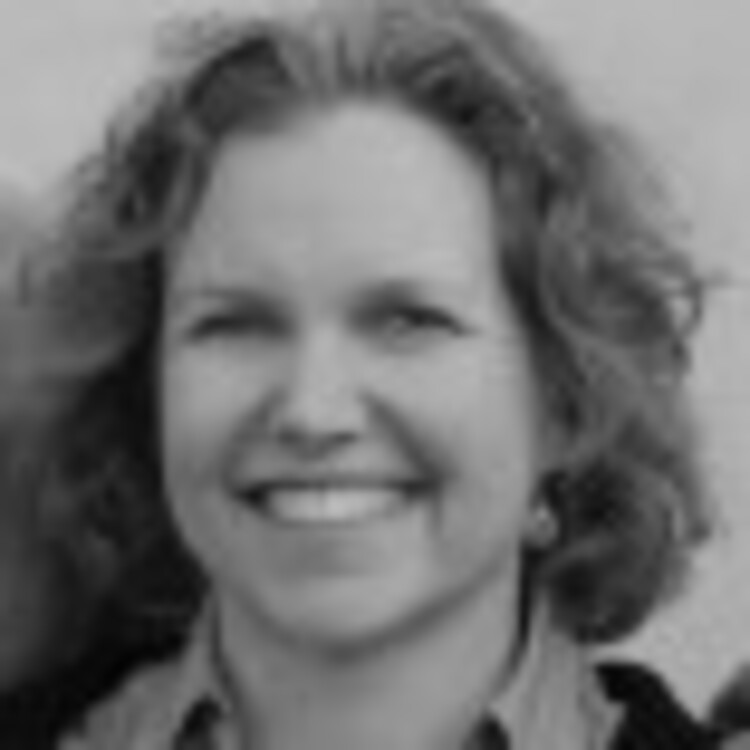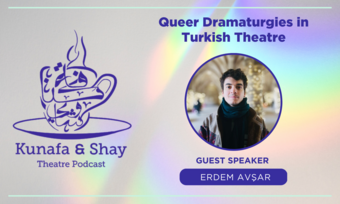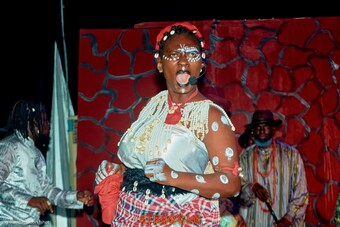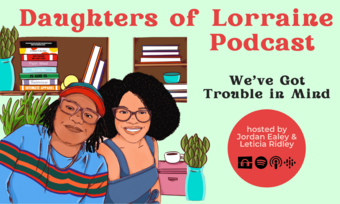Invitation
Erik Ehn, Caridad Svich and their Collaborators
With art, ultimately it is about the invitation. How do you invite someone into the work? What is the essential spirit of the invitation? In the end, the invitation may be all you have. The result of it is a mystery… an honest gamble…you are saying: hallo. Wanna play? The heart of the invitation is always vulnerable.
—Caridad Svich
I recently stepped down as the Endowed Chair and Head of Dramatic Writing at the University of New Mexico where I worked with diverse playwrights. I’m delighted that my former students are now working as professors, leaders, producers; writing in the Emerging Writers Program at the Public Theatre, interning at the O’Neill, and American Theatre magazine.
Playwrights, especially those who are women, Latino/a, Native, LBGT, experimental can be disempowered before they even pick up their pens.
But I am concerned. Playwrights, especially those who are women, Latino/a, Native, LBGT, experimental can be disempowered before they even pick up their pens. How do we continue to invite and inspire each other, when bombarded with depressing statistics about the theatre/media, the shrinking of public space for gathering, democratic protest and the arts?
As part of my job in New Mexico, I served as Producing Artistic Director of the new play festival for the MFA dramatic writing students. Empowering the next generation of writers involves creating positive feedback loops, where they see they have a future and a community—locally, nationally, and around the world. One positive feedback loop I built involved bringing in national and international directors to link students to their distinct networks. This had the added benefit of encouraging students who hadn’t even identified themselves as writers yet, especially in the Native and Latino/a communities.
During my time in New Mexico, I began to realize producing is a form of writing, of making a new theatrical reality. Partly due to issues of department structure/budget, I started involving the MFA dramatic writing students in producing. As part of the process, I asked them to create and present their ideal new play center. Their ideas were wonderfully wild, inclusive, fun. One student even invented a theatre laundromat, based on an idea from the Portland music scene.
As I’ve moved on with my life, I decided to take up Polly Carl’s call to "redefine success" this year. I decided to look for fresh inspiration in my own positive feedback loops. Specifically, I wanted to look at playwrights who are using social media and international networks to create futures and communities: Erik Ehn and Caridad Svich. For over ten years, no matter where we are in the world, Erik and Caridad have championed and published me, invited me to present on panels at conferences, recommended I lecture abroad, asked me to write plays. At the heart of their invitations is the experience of being part of a community. When I looked up the word community, I found it comes from the Latin communitas (cum, with/together + munus, gift). Their invitations to community are a gift—they have provided deep respect, true listening, galvanization for excellence, courage and compassionate understanding from my colleagues.
I suspected that Erik and Caridad’s new work was tapping into the core power of what theatre can do, but I was hearing that the coverage of their latest projects was slim. I decided to cover their projects by interviewing Erik, Caridad, and their collaborators, by reading their online archives and the twenty-one plays they wrote for their latest initiatives. True to form, they also invited me to participate in their newest projects, Erik’s National Station Fire Memorial, Caridad’s Theatre Action as part of the March on Washington for Gun Control. I’d experience their modes of working—directly.
Erik Ehn’s project, Soulographie: Our Genocides is a seventeen-play cycle, a culmination of twenty years of his work writing about genocide around the world, in Central America, Bosnia, Africa, and Tulsa, Oklahoma. The collection is recently published by 53rd Street Press. Two years ago, over coffee with Erik at the ferry terminal in San Francisco, I watched as he invited collaborators to retreats and productions across the United States, Africa, and Poland, converging on LaMama in New York City in November 2012. Even at their early meetings, the passion to reflect, gather, consider, and make art was remarkable.
Caridad Svich created a brilliant “scheme.” In April 2012, through her online NoPassport Alliance, I noticed as she invited theatre artists to do a reading of The Way of Water (TWOW) her play that pits the BP oil spill next to the lives of those affected. Fifty-two theatres around the world accepted, across the United States, in Berlin, the United Kingdom, Wales, Tasmania, and South Africa. In November 2012, she opened up her play, Spark, about three sisters caught in war’s aftermath, to raise awareness around veterans’ lives before the election. Forty-two theatres, from Santa Fe to New York, the United Kingdom to Korea participated. The Way of Water and Spark are part of Caridad’s new quartet of plays centering on issues of the US’s working poor, which also includes Hide Sky and Guapa.
Definition
I started by asking Caridad and Erik how they saw their dual role, as playwright and leader. Erik said he is “neither.” Whether he writes a play, organizes a meeting, or leads a silent writing retreat, he says they are all the same, they are table setting. He views his work as “trying to create circumstances for people to discover themselves with the best materials I can provide.” A cook provides food, an architect provides a space to live in; he provides dramatic structures. He does not view himself as the leader or founder of either the Regional Alternative Theatre Movement (rat) or the Arts in One World Conferences. rat, in particular, was “never founded”; it was “serially rededicated.” Anyone can call themselves the head of rat, can call a meeting, creating vitality and opportunity through anarchy.
Caridad sees her dual role as “part and parcel of the work.” Change happens through gestures small and big. For her, publication is a political act, the same as writing. Caridad edits and curates for many international publications, including operating NoPassport Press, which she says, “stems from a desire, perhaps romantic or progressively utopian, that performance literature deserves to be recorded not only for future generations, but also for the life of drama itself.” She is able to question “who gets to write history and why? Who gets to decide what is major and what isn’t? Does theatre history thrive only on the power of capital? What is the legacy then?”
Power of the “Invitation”
After finishing The Way of Water in the Lark Play Development Center Winter Writer’s Retreat, Caridad knew she didn’t want to wait the months and sometimes years it sometimes takes to move a script to an encounter with an audience. Fueled by outrage about the disaster and its aftereffects on the ecosystem and lives of our citizens in the Gulf region, she decided to create a shared ritual. She cast a wide net, calling and emailing colleagues to see if they might want to do a reading in their city to raise awareness and foster dialogue.
Admittedly, these modes of working are not financially profitable. In accepting Erik and Caridad’s invitations, vulnerability allowed for vulnerability, generosity met generosity. Monica Callan of Moxie Productions in Vermont (and an Emerson alumna) participated in the Spark reading scheme. She is dedicated to producing stories that include voices that are not always heard. Monica says, “there are many things you consider when you take on a project, and there was something so right about this.” Through the experience of producing two readings, she was able to see veterans in her community have the space to become vulnerable, to admit what they were going through.
The Soulographie design asked participants to self-produce the plays and to come to New York. Erik mentions the initial intent was extremely powerful in terms of pulling them through the challenges, which included a medical emergency and Hurricane Sandy hitting New York. He writes,
“We repeated through the process that the work had to be perfect, with the notion of that separate from money, material accomplishment, or refinement. Perfect = an uninterrupted relationship between intention and execution. A reading with one rehearsal could be executed perfectly if the intention is properly articulated.”
Erik’s invitations were based on professional friendship, real sympathy, long-term collaboration or recommendation. The basis of their alliance preceded funding. “There was never enough money,” he said, but these people were still “willing to go forward,” with such an ambitious project.
Meredith Lynsey Schade, the lead producer, quite movingly, mentioned that her favorite moments, both artistically and personally, came from companies who were enthusiastic about working with what they actually had. She mentioned the magic of John Moletress’s staging of the play Shape, how he worked with a black and white palette of shredded newspapers as set, “a kind of human-sized zen garden.” Jeanette Oi-Suk Yew, who designed many of the Soulographie plays writes, “ultimately the care we invest to support humanity is the capital that makes it all work out.” Meredith says, “When the impossible becomes possible, it is absolutely rewarding.”
Jeanette says that Erik inviting her to design his plays is like being given a “blank check…here it is, do what you want.” She, and many other collaborators found it very important to have him in the room. Mia Rovegno, the director of the play Burnt Umber, thought of him as a kind of “hieroglyphic translator.” Jeanette found it essential to invite Erik back into the process; talking to him about the spiritual and philosophical, but also the material, such as “do you think a white chair would work?” The playwright invites, the collaborators, in turn, invite the playwright to participate in the rehearsal. Caridad speaks lovingly of the “practice hall” where the script is found through “the play of ideas through hearts, minds, and bodies.”
Marks on the Page/Impact
How did the plays themselves work? How did Erik, Caridad, and their collaborators experience their writing? Caridad points out we are rehearsing, “past marks and signs on the page…a pretty odd endeavor, if you think about it.”
Caridad discovered that “the work is always finding itself. She found with “two hundred actors and fifty directors and a net audience of a thousand over two months time in over fifty cities” her scheme was as vital and energizing a process as any other “sanctioned” model of how a new play can move into the world. Her scheme design mimicked the “immediacy of virtual culture and social media” allowing her to “bypass the gates of theatre culture.”
Monica of Moxie Productions mentions she especially appreciated Caridad’s writing. She thought perhaps Spark was too subtle at first, but she found that Caridad’s extensive research, leading to specific details about the character’s lives, worked amazingly well. “It sneaks up on you. It moves people in quiet, gentle ways; it coaxes you, suddenly you’re there, really seeing it, really being in it.”
With Soulographie, Erik saw twenty years of writing, heard the plays talk to each other, to audiences. He found the experience quite moving, surrounded by people he cared for and admired, which enabled him to be less self-conscious and to experience himself as ”just one person in the circle.” He was able to see his habits and preferences, how he’d move away from, then deeper into them, to be with it without anxiety. Some audience members evaluated the cycle as a “bunch of plays,” while others found the cycle a way to mourn people and places that are not present, to be with situations people had formerly ignored or found remote...a general, contemplative, “falling forward into witness.”
Mia Rovegno found directing Erik’s writing a contemplative experience. She had to “actively resist indulging [her] poetic instincts to further abstract a piece that was already playing at such a high decibel of abstraction on the page.” She found it important to “anchor the poetic motifs and the musicality of the language,” in “events in the play revealed…as very clear narrative.” Other moments allowed them to let the language just “happen to them, like a tide that unexpectedly rushes toward us and washes over us, messy and sprawling and full of heart.” Designer Jeanette Oi-Suk Yew found Erik’s language so fully visual that it was important to avoid both being literal or illustrating the text. She worked to understand what the text is actually doing, to study Erik’s plot summaries and speak to him directly, in a kind of archeological dig. The cycle of plays worked in accumulation. She mentioned the enormity of genocide cannot be easily digested, and neither can the plays. Because you can’t digest it all, she said, it actually makes you think about it. She views the West as tending to look for easy solutions, with an issue as enormous as genocide, simple solutions are part of the problem. Like Caridad’s writing, the way Erik’s writing works, she says, is “subtle,” it “creeps up on us without knowing.”
Caridad and her collaborators were stunned by the impact of the audience reaction. Gloria Mann, who organized the reading of Spark at Cherry Lane in New York City pointed out how many veterans return home to “joblessness, disconnectedness, addiction, trauma, PTSD, and lack of support.” In addition, there are “countless reports concerning the rape of women in our military,” and finds, “arrogant military leadership too often sweeping women’s trauma under the rug.” Gloria said, regarding her reading and panel, “it was humbling and inspiring to feel part of a great healing process that only now seems to be beginning.”
Alex Davis, who with Heather Helinksy, served as dramaturg for TWOW found theatre’s particular power:
“I've always been skeptical of whether so-called ‘political theatre’ is actually capable of creating real change. In a talkback with the head of NYU's environmental studies program, I asked her to advise the audience on what they should do after seeing the TWOW reading. She said that, ‘First, you have to open people's hearts’—that the emotional appeal inherent to theatre could play an important role in affecting people's behavior. Coming from a scientist, this was not obvious…but it is sometimes easy to forget….You’re not ‘selling the machinery.’ You’re opening the heart.”
Zac Kline, dramaturg for Spark, was one of the many who are inspired to make their own new models: “As a young playwright and dramaturg I think this is an exciting and vibrant way to work. Plays, especially new plays, need to be read and shared. Working in this way lets playwrights, and more importantly audiences, engage with new texts.” He says he will work this way again. Alex Davis writes, “TWOW proved a point…that there can still exist a kind of grassroots theatre movement…if you reach out to the theatre community, it will respond.”
No Turning Back
Many of Erik and Caridad’s collaborators wish more theatre artists and institutions would be less afraid to take risks. Monica of Moxie Productions bemoaned the desire in the theatre to be perfect, to always make a profit.
After creating her schemes, Caridad finds it hard to contemplate going back to business as usual in the theatre, believing each play has its own path and part of our job is to find out what that is. She finds that organizing initiatives gives her courage. The NoPassport Conferences, publications, and less visible discussions and salons have literally created an artist village/alliance that made the difference in writing her quartet and devising new ways of moving her work into the world. As a participant, I can attest to what Caridad calls the “power of communal gatherings toward a more just society, a more civil life, and toward a more civil—yes—ecumenical theatre record.” She cites the importance of advocating for each other. “Being in the profession means that you’re going to spend part of your life making work and part of it mentoring others, and a great deal of it making each other better. Do you care about the field? About the future of theatremaking? Then advocate. Make a point of getting out of your own head, and be in the wide global room with your fellows.”
Even though he helps his students find ways to make a living as writers, Erik finds the idea of writing with a plan to sell his work to strangers heartbreaking, something he has zero interest in either reforming or critiquing. “The business of theatre is irrelevant to the real ground of theatre.” He now writes for something or for nothing—if someone asks him to, or without external motivation.
I accepted Caridad and Erik’s invitations to write short plays for their current projects—Caridad’s NoPassport Gun Control Theatre Action, part of the March on Washington (24 Plays About Gun Control is now published by NoPassport Press) and Erik’s National Reflection on the Station Nightclub Fire in Rhode Island. I intimately know their invitations open the heart. They provide opportunities to come together despite tragedy, reminding me—theatre is as powerful, beautiful, and transformative as ever.
While I realize that often producing can be exhausting, what if we made sustainable models as Caridad and Erik have done? What if we participated in invitations that sometimes streak by our busy lives? Every time you write, produce, direct a play you make a community. What will yours look like?












Comments
The article is just the start of the conversation—we want to know what you think about this subject, too! HowlRound is a space for knowledge-sharing, and we welcome spirited, thoughtful, and on-topic dialogue. Find our full comments policy here
-sharing community, in practice, benefits many and goes beyond the borders we create and live in. I also love Eric's setting table practice. -and thanks to you for the article.
We are very excited about an upcoming presentation at the University of Minnesota-Institutue for Advanced Study on Thursday, April 18: playwright/artists Caridad Svich and Rachel Jendrzejewski will engage in a conversation on best practices in the collection of life stories for scholarly and creative work, moderated by Gail Dubrow. Free and open to the public. Full information on the panel is at http://ias.umn.edu/2013/05/...
Thanks for investigating these lovely processes! Really loved the idea of creating dramatic structures and organizing as different offerings of the same intent: table setting for self discovery.